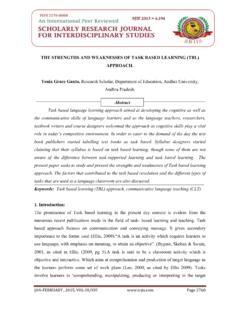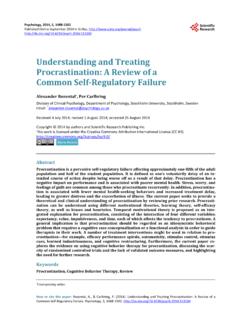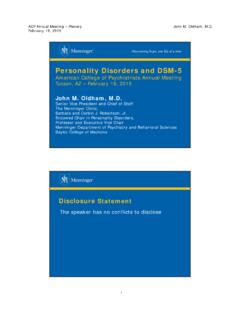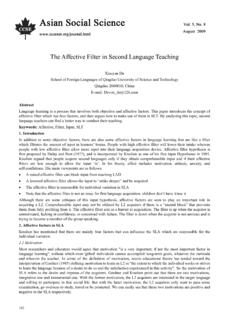Transcription of Self-Concept and Interpersonal Communication
1 The International Journal of Indian Psychology ISSN 2348-5396 (e) | ISSN: 2349-3429 (p) Volume 3, Issue 3, No. 6, DIP: ISBN: 978-1-365-11998-9 | April - June, 2016 2016 I P Samthirao; licensee IJIP. This is an Open Access Research distributed under the terms of the Creative Commons Attribution License ( ), which permits unrestricted use, distribution, and reproduction in any Medium, provided the original work is properly cited. Self-Concept and Interpersonal Communication Prabhakararao Sampthirao1* ABSTRACT One of the main things impacted by our Self-Concept and our self-esteem is our Communication . Self-Concept , self-image, self-esteem and self-efficacy are major factors in the way we communicate. Whether we are introverts or extroverts that can be seen in the way we communicate with others. Communication becomes smooth when we become part of it.
2 People with high self-esteem are confident, responsible, committed to goals, genuine and forgiving. An artificially inflated self-esteem is an effort to appear to have high self-esteem. However, such individuals don't typically show the characteristics of people with high self-esteem. Whereas people with low self-esteem are insecure, unhappy and impatient, but people artificially inflated self-esteem try to appear to have high self-esteem in an effort to compensate their deficiency. There are certain ways improve one s self-esteem. Development of a relationship is closely related to systematic self-disclosure which again another form of Interpersonal Communication . General personality traits such as quietness, shyness, and reticence frequently precipitate Communication Apprehension. Prevention and treatment methods of Communication apprehension are now available.
3 Keywords: Self-Concept , Interpersonal Communication The way we communicate is greatly influenced by our Self-Concept especially self-esteem. Only because of this influence some of us introvert, some others are extroverts and still some others are mixture of both. If somebody focuses on his or her sense of humor in his/her talks, he will be seen as a funny person by all around him whether or not he himself aware of it. Our emotional needs and desires dictate our Communication . If a person perceives himself as an introvert, but he or she doesn t like to be attributed so as it negatively affect his /her self-esteem and he may really want to be a funny person, he reassures himself again and again having a great sense of humor and he goes on to great lengths and breadths to tell jokes and try to amuse others. Before going into the detailed discussion about our own Communication forms, we need to understand certain basic terms and their association with development of our Communication 1 Health Education Officer, Central Health Education Bureau, New Delhi *Responding Author Self-Concept and Interpersonal Communication The International Journal of Indian Psychology, ISSN 2348-5396 (e)| ISSN: 2349-3429 (p) | 178 habits.
4 These are Self-Concept , self-image and self-esteem. Communication become smooth when we become part of it, being a part of it doesn t mean only our physical involvement, but attributes of our , how we see ourselves, what type of feelings and thoughts we hold about our strengths and weaknesses. Relatively what kind of sustained perceptions we hold about ourselves, our emotional states, talents our likes, dislikes values and roles etc., how we want others to see us, how we think others should see us and how we want to see ourselves. All these attributes determine our Communication habits. Most of our Self-Concept is a reflection of our relationships and the people around us. Our parents, near relatives, friends, heroes and bullies, all have influenced the way we perceive ourselves. How does Self-Concept affect our Communication ? Our self-concepts continuously develop and re-develops through constant reflection of our own images through others by variety of processes like looking glass self (1) reflected appraisal, ego boosters and busters; social comparisons (superior/inferior, same /different); cultural teachings and our own interpretations and experiences.
5 Cultural influences on Self-Concept differ greatly from individualistic cultures to collectivistic cultures. In individualistic cultures just like in western cultures, self is separate, unique from other individuals and develops into independent, self-sufficient and without botheration about interdependence and place more emphasis on individual decisions and values, autonomy, youth, change, individual security and equality. These cultures reward and value individual achievements and blame individuals for failures. On the other hand, collectivistic cultures, like in oriental ones promote we orientation and emphasize extended families, their care and in group living. Groups share credit as well as blame and reward contribution to group goals and group decisions, duty, order, tradition, age, group security, status and hierarchy. The five characteristics of Self-Concept are that it affects Communication .
6 It is subjective, resists change, multi-dimensional and flexible. Our relationships with other people mainly affect two areas of our Self-Concept . , our self-image, or characteristics or traits we believe that we possess, and our self-esteem or our evaluation of what is worthwhile or valuable about ourselves. While our self-image is the descriptive side of our Self-Concept , the self-esteem is the evaluative side, which means the side that assigns value and worth to those traits and characteristics. The way in which I perceive myself is my Self-Concept within which my self-image perceives that I am below average handsome and a good writer. My self-esteem places more value on my writing skills than my physical personality as a positive aspect to which I belong. This entire process is a subconscious reflex that can cross into conscious awareness, but it's happening all the time throughout our lives.
7 Self-Concept , especially self-esteem, is a major factor in the way of our Communication . Our Communication may also directed by our self-esteem and Self-Concept , because it can often feel forced or unnatural, since it may not be that person's natural Communication style. People can lose sight of their natural Communication habits by trying to make up for what they see as a deficiency in their personality . Self-Concept and Interpersonal Communication The International Journal of Indian Psychology, ISSN 2348-5396 (e)| ISSN: 2349-3429 (p) | 179 Distortion of Self-Concept Self-Concept is derived from self-esteem and self-efficacy, but previous experiences may distort one s self concept as self-assessment may not always accurate. If a person has low self-esteem, the Self-Concept may be skewed in the negative direction. People with good self-esteem and efficacy are often able to recognize their limitations without any judgment attached to it(2) The Self-Concept is subjective, which means it is subjected to obsolete, half-baked information and can be distorted after the subjective feedback, too much emphasis on perfectionism.
8 Social expectations like modesty or egotism also affects Self-Concept . Self-Concept is conservative and resists change and tends to cling to present even when evidence shows that it is outdated, cling to negative outmoded self-perception whether it is positive or negative and therefore, result in self-delusion and lack of growth. A healthy Self-Concept is flexible and subject to change like any other phenomena, therefore, we need to constantly adjust our Self-Concept according to the changes that are taking place in our surroundings. In the course of changing our Self-Concept , we should have will to change and develop necessary skills to change and cultivate realistic expectations and always strive for such realistic perception (4). Self-Concept operates at multi-dimensional levels. If there is a mismatch between how you see yourself ( yourself image) and what you d like to be ( your ideal self) then this is likely to affect how much you value yourself.
9 Therefore, there is an intimate relationship between self-image, ego-ideal and self-esteem. A person s ideal self may not be consistent with what actually happens in life and experiences of the person. Hence, a difference may exist between a person s ideal self and actual experience. This is called incongruence. Where a person s ideal self and actual experience are consistent or very similar, a state of congruence exists. All persons experience a certain amount of incongruence as in reality rarely does a total state of congruence that ever exists. The development of congruence is dependent on unconditional positive regard. For a person to achieve self-actualization they must be in a state of congruence(3).There are four major factors which influence its development firstly, the ways in which others (particularly significant others) react to us. Secondly, how we think we compare to others, thirdly, our social roles, finally, the extent to which we identify with other people(5) Self-Concept has three components , the view that person has for himself , self- image; the value a person place upon himself is self- esteem and it always involves a degree of evaluation and we may have either a positive or a negative view of ourselves (3).
10 A person's self-image does not necessarily have to reflect reality and it is affected by many factors, such as parental influences, friends, the media etc. Self-Concept is also derived from self-esteem and self -efficacy. Self -esteem is the regard or respect a person has for himself and a person with positive feelings is said to have high self- esteem. However, self- esteem can refer to very specific areas as well as general feelings about self. For example, a person may have low self-esteem about his physical attractiveness but high self-esteem of doing a job well. In uncertain or anxiety arousing situations our self-esteem may change rapidly (6) Self-Concept and Interpersonal Communication The International Journal of Indian Psychology, ISSN 2348-5396 (e)| ISSN: 2349-3429 (p) | 180 There are four major factors that influence self-esteem and they are the ways in which others (particularly significant others) react to us, while affirmative reactions develop a positive self-image and reactions of avoidance develop into negative self- image.


















